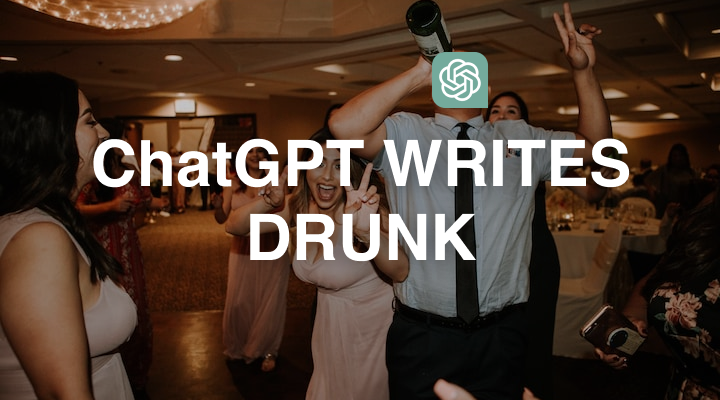In my last article, I made the case that generative AI like ChatGPT are creative but not creators. They're creative because, just like humans, they can produce remixes of material that an audience finds interesting or novel. However, because they aren't curious or compelled to share their perspective, they aren't creators themselves. Generative AI like ChatGPT are just creative tools.
So, in this post, I want to discuss how this new class of creative tools can make writing more accessible, fill in our gaps and limitations, and also create a fine line between amplifying and limiting our own creativity.
But first, let me start off by admitting something. I find ChatGPT to be an aspirational writer. Why? Because...
ChatGPT writes drunk.
There's this quote in writing circles that's often misattributed to Ernest Hemmingway that goes, "Write drunk; edit sober". Obviously, it's not literal advice. The pithy proverb simply gets at the heart of the hardest thing to do as a writer: write without inhibition.
This is incredibly hard because, as humans, we are trained to be critical. We're curious problem solvers who are always on the hunt for something to solve. But this superpower gets in our way when we're trying to be creative.
When we bring something from our imagination into the real world, it's never as beautiful as it was in our heads. And this can cause us to start self-editing; trying to fix problems with our work before it even exists. This is what causes us to stare at the blank page with writer's block - we're stuck in a loop of writing and editing at the same time.
And that's why I find ChatGPT aspirational - because it has no inhibition. It doesn't self edit. It doesn't get writer's block. When it writes, it is literally doing what all great writers strive to do: focus solely on getting out the next word and keep doing that until you think you're done.
ChatGPT's process is inspiring, but it can also be leveraged. As humans, it's extremely hard for us to turn off our critical, self-editing minds and just write. But with tools like ChatGPT, Lex or Rytr, the modern writer might be able to use technology to overcome that limitation.
Imagine having an idea for a book, essay, or movie script and prompting one of these programs to spit out a first draft. It would probably be boring and unrefined, but that's okay - because our own draft probably would have been too. It's just that, thanks to generative AI, we didn't have to spend the time judging every word - forcing ourselves to spit out something we know is terrible simply so we can refine it later. The AI did that hardest part for us so that we can focus on what we're best at:
Making something bad better.
While working on this article and thinking about this shift in the writing process, I've been almost melancholy. In a way, I feel a looming sense that we might be losing something if we no longer have to drudge through that drudgery of starting at the blank page. But I also feel like this must be the emotion that drove my teachers to argue with me about the value of pen and paper over typing.
They felt that there had to be some intrinsic good in the movement of one's hands across the page that made them a better writer - because that's how they wrote. Whereas I - to this day - can not keep my hand still enough while writing to maintain any semblance of legibility. For me, the traditional technology was a limiting factor for my writing. The new technology, the computer, allowed me to overcome my own limitations. It made the process easier and more accessible.
Now, some people I'm sure will dig into their dogma and say that those who use generative AI tools aren't "real writers". This is just like how today in woodworking communities, some believe that working with power tools means you are not a "real woodworker".
To that end, I feel like writing without a text generator like ChatGPT will be seen in the future like hand tool woodworking today. People will be impressed by the time and dedication of using more primitive tools, but very few people will choose to take on that type of masochism themselves. Today, most people opt for the tool that does the bulk work for them so they can focus on refining wood into furniture; and in the future, I think the same will be true for turning words into prose.
However, just like with power tools, the increase in speed and ability of technologies like ChatGPT also presents an increase in danger to those that utilize them. But - unlike an open blade spinning at 2,000 RPM - the danger of a tool that spits out coherent, stylized, and usable text based on nearly any prompt is non-obvious.
Obviously, there are the macro-societal dangers caused by the increased ease in creating propaganda or media designed to manipulate the major beliefs of the populous. But that is outside the scope of this article. The danger I am concerned with at present is the danger to the individual - to the artist.
The danger here, is that we lose our own voice. We accept what the machine gives us as "good enough", and in doing so our work becomes the product of someone else's vision. We lose our own creative license, and we become a tool for the machine; our only function being to prompt and publish.
To understand how we avoid this conundrum, I want to talk about...
The Difference Between Tools and Machines
Recently, I played a video game called Pentiment. It's a text-based RPG about the role of storytelling, history, and tradition during major societal inflection points. It's extremely good and I highly recommend playing it.
In it, you play as a manuscript artist in Bavaria just after the invention of the printing press. As a manuscript artist - someone who draws pictures in books - you have a unique perspective on the transitions happening in book making. Your mentor and father figure is a scribe at the monastery, and your best friend is the first printer in town.
Throughout the story, you see the dramatic affects this technology had on society by watching changes take place in a small town over a 50 year period. One of those things you get to see is the evolution of printing as a practice.
In the beginning of the game, your friend - the printer - is constantly fixing and fiddling with his machine; learning just the basics of how to get it to produce something. Then, over time, he starts having conversations with you about different approaches he's taking to get more out of the machine - buying typefaces, inks, print boards, etc. Finally, by the end of the game, his daughter and her best friend are making their own inks and planning to open their own shop in Prague.
The printing press came onto the scene, like most new technology, as a machine designed to automate the work of humans. Given the same amount of time, the press could copy hundreds more manuscript than the monks in the monastery. And in theory, because learning to operate the machine was orders of magnitude easier than scripting, it was going to commodify the once artistic work of producing printed material.
But printing actually became a trade and craft in itself - a new form of artistry. Why? Because there was a group of people who operated these machine that didn't just pull its levers and produce its prints; they pushed its boundaries. They didn't settle for what the machine gave them; they asked more of it.
They became curious; they tried to figure out how the machine could be hacked and manipulated into producing things of their own imagination. In essence, they turned the machine into a tool. They became printers - not just operators of a printer.
I think this distinction is something to think about in the context of ChatGPT. Out of the box, just like the printer, this new technology dramatically advances our capabilities for production of the written word. With very simple actions, the machine can achieve fully finished works in significantly less time than any human. In ChatGPT's case, we could even make the argument that the result is also sometimes preferred to the work of a human.
And because of that, there will be those that give up their voice, their creativity, their curiosity to ChatGPT. There will be those that simply operate it as a machine - giving it prompts and publishing its work. But there will also be those that push its boundaries; that ask more of the machine.
There will be those that become curious and discover ways of working with it that were unintended in order to get it to produce works that closer align with their own imaginations. Those people will turn prompting into a craft and will turn ChatGPT into a tool.
That being said, I implore you to use these new generative AI tools to your advantage. Try them. Break them. Push their boundaries. Make them work for you.
Be an artist.
What do you think?
Are you using ChatGPT in your work? Are you afraid or angry about the advent of AI? As always though, these essays are designed to start conversations.
So, please let me know your thoughts by sending me an email or DMing me on Twitter (for now). Also, if you want to get notified the next time I post, you can subscribe to my newsletter using the form below.
Until next time.

